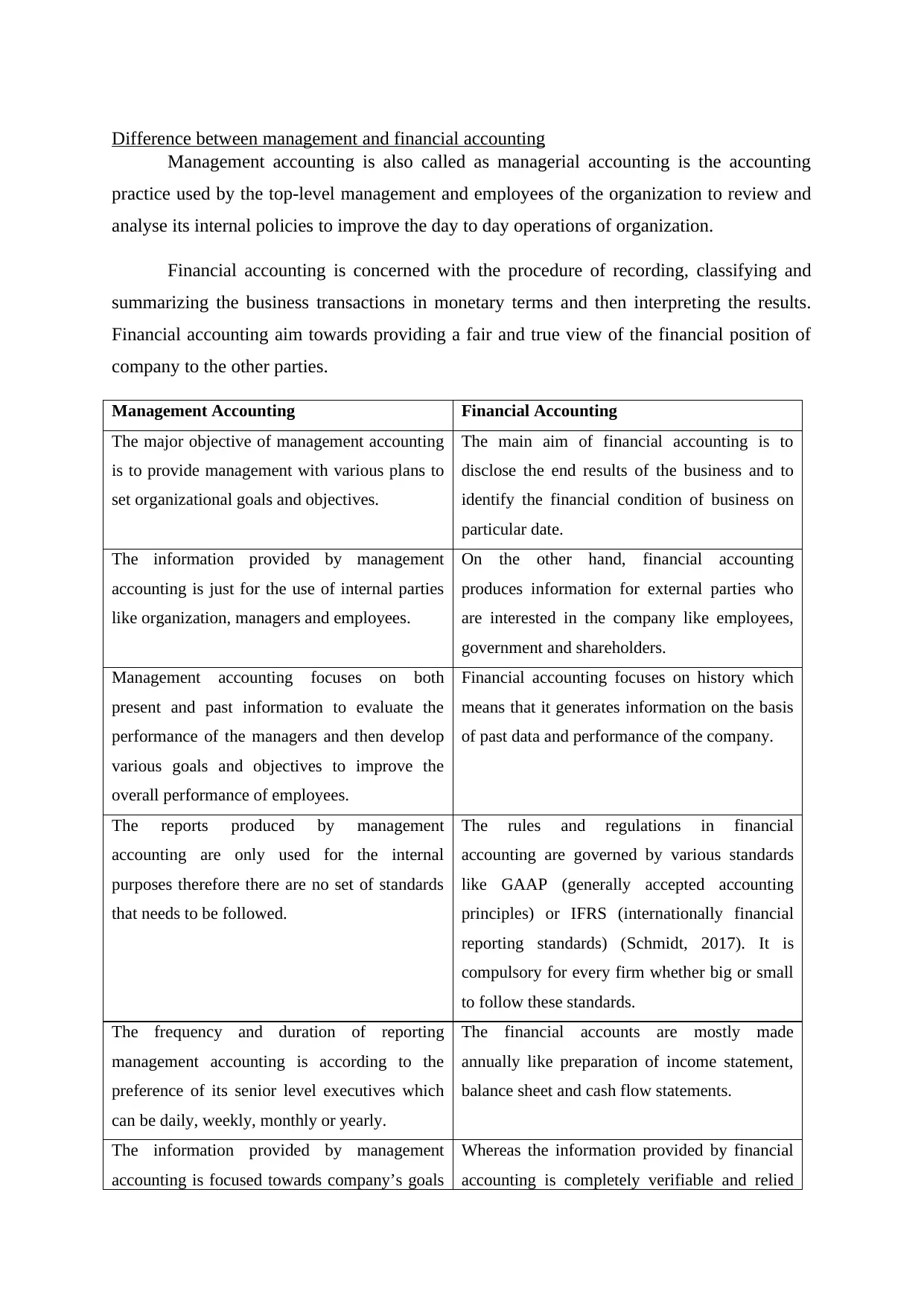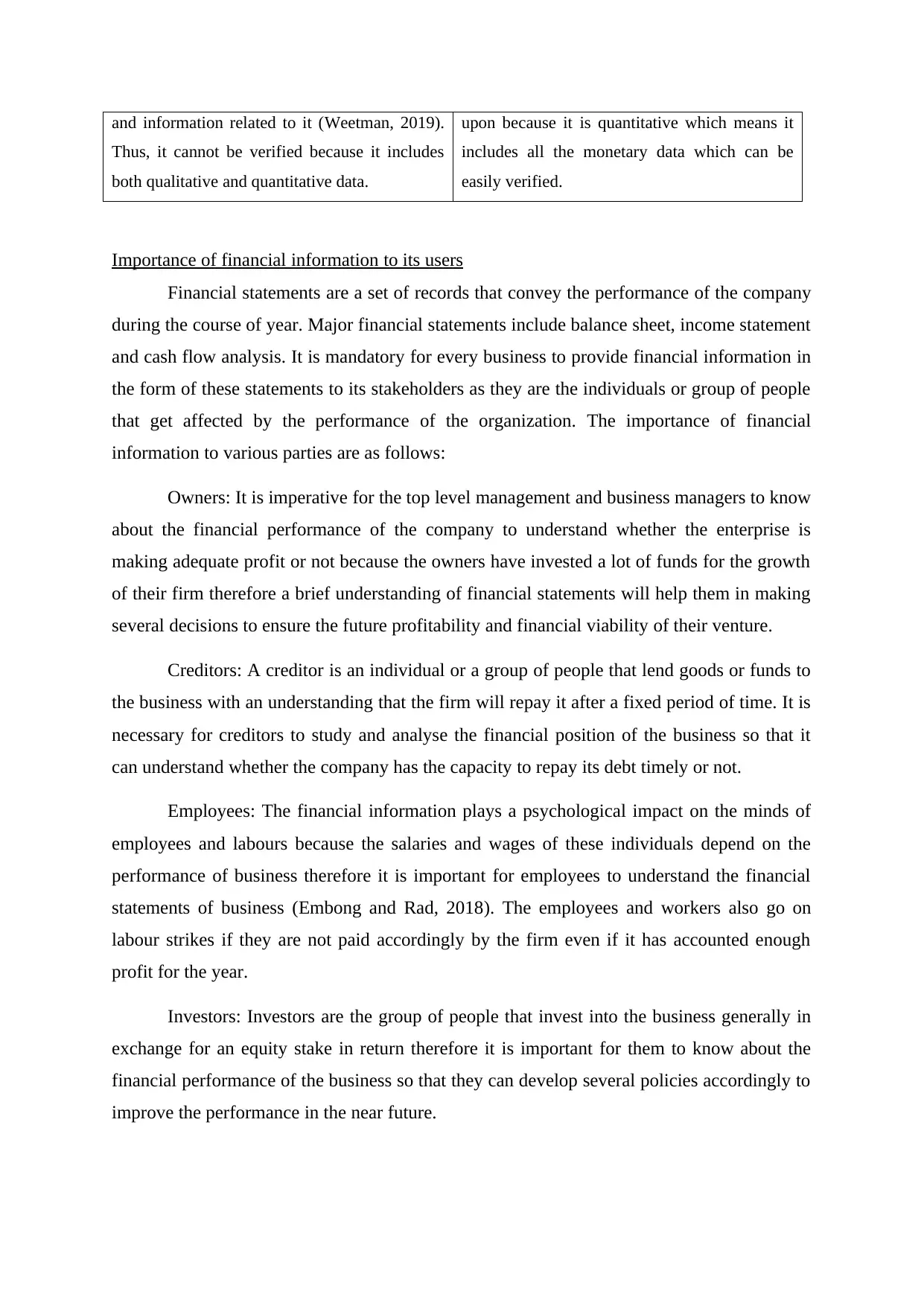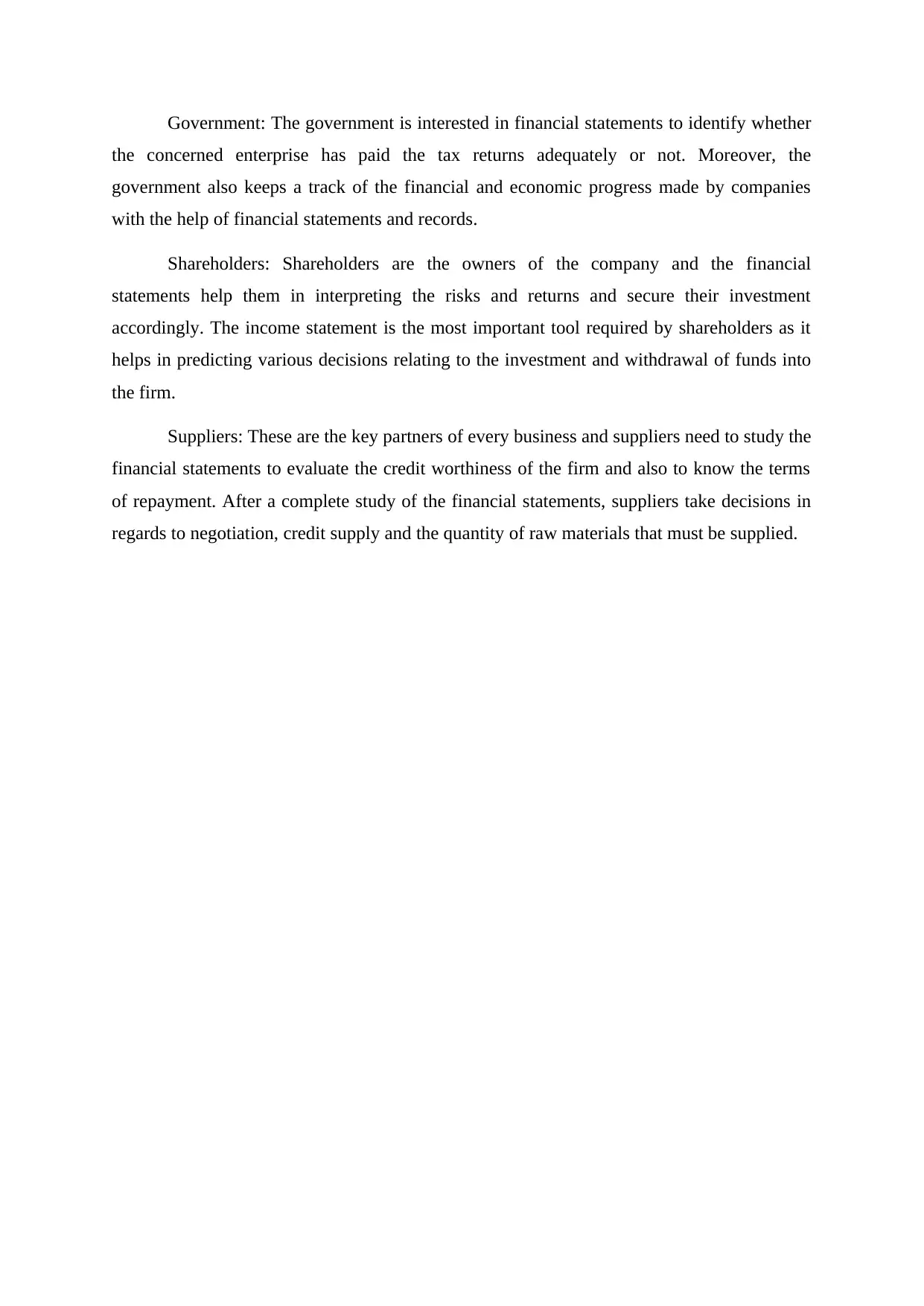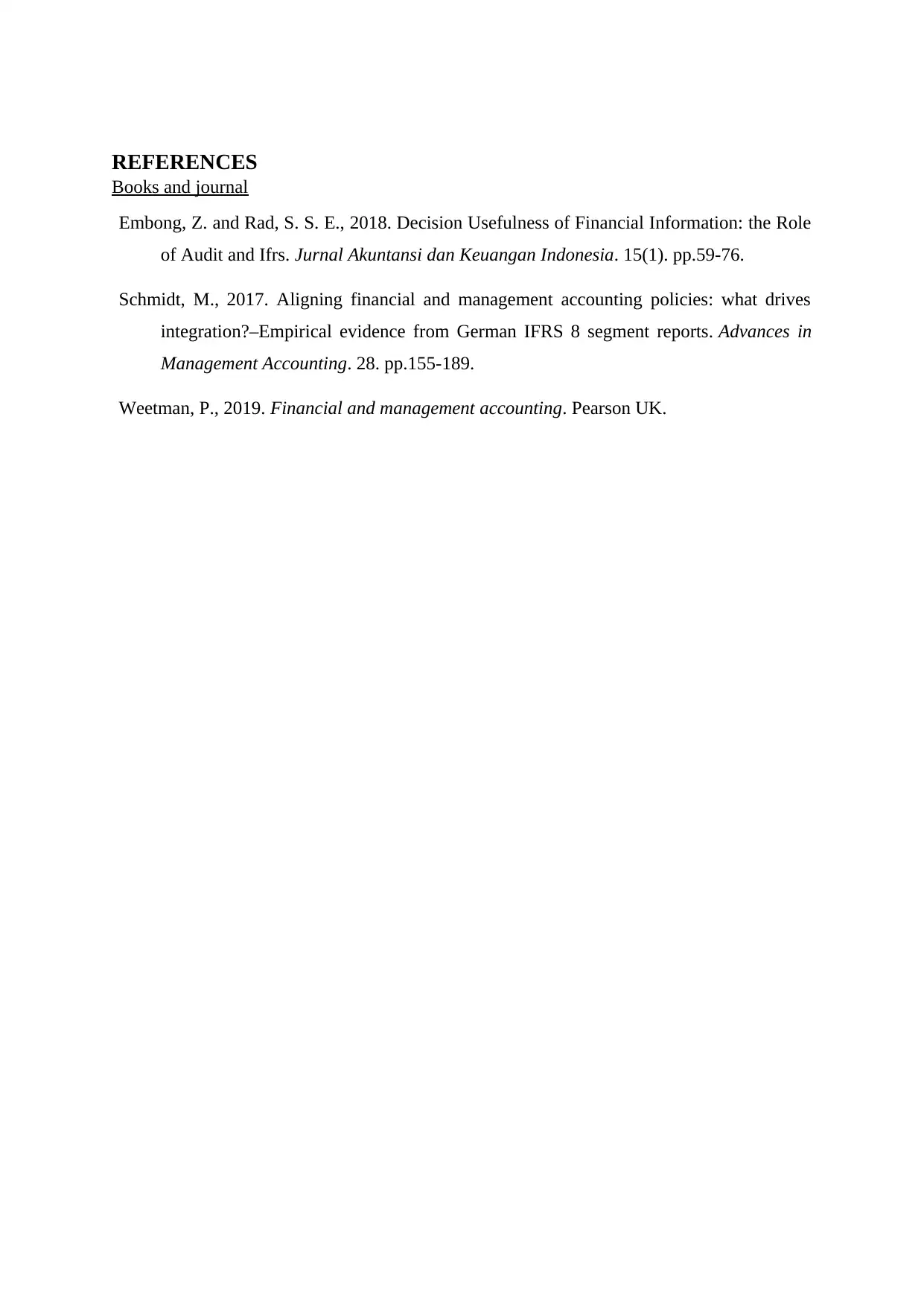Comparison of Management and Financial Accounting for Business
VerifiedAdded on 2023/01/11
|6
|1090
|45
Report
AI Summary
This report provides a comparative analysis of management and financial accounting, elucidating their distinct objectives, target users, and reporting methodologies. Management accounting, also known as managerial accounting, is designed for internal use, assisting in operational improvements and strategic planning. Conversely, financial accounting focuses on providing a comprehensive overview of a company's financial position to external stakeholders such as investors, creditors, and the government. The report details the key differences in their approaches, including the application of standards like GAAP and IFRS in financial accounting. Furthermore, it emphasizes the importance of financial information to various users, outlining how financial statements like balance sheets, income statements, and cash flow analyses are crucial for informed decision-making by owners, creditors, employees, investors, government bodies, shareholders, and suppliers. The report underscores the significance of financial data in assessing a company's performance and making strategic financial decisions.

BUSINESS FINANCE
Paraphrase This Document
Need a fresh take? Get an instant paraphrase of this document with our AI Paraphraser

Difference between management and financial accounting...................................................3
Importance of financial information to its users....................................................................4
REFERENCES...........................................................................................................................6
Importance of financial information to its users....................................................................4
REFERENCES...........................................................................................................................6

Difference between management and financial accounting
Management accounting is also called as managerial accounting is the accounting
practice used by the top-level management and employees of the organization to review and
analyse its internal policies to improve the day to day operations of organization.
Financial accounting is concerned with the procedure of recording, classifying and
summarizing the business transactions in monetary terms and then interpreting the results.
Financial accounting aim towards providing a fair and true view of the financial position of
company to the other parties.
Management Accounting Financial Accounting
The major objective of management accounting
is to provide management with various plans to
set organizational goals and objectives.
The main aim of financial accounting is to
disclose the end results of the business and to
identify the financial condition of business on
particular date.
The information provided by management
accounting is just for the use of internal parties
like organization, managers and employees.
On the other hand, financial accounting
produces information for external parties who
are interested in the company like employees,
government and shareholders.
Management accounting focuses on both
present and past information to evaluate the
performance of the managers and then develop
various goals and objectives to improve the
overall performance of employees.
Financial accounting focuses on history which
means that it generates information on the basis
of past data and performance of the company.
The reports produced by management
accounting are only used for the internal
purposes therefore there are no set of standards
that needs to be followed.
The rules and regulations in financial
accounting are governed by various standards
like GAAP (generally accepted accounting
principles) or IFRS (internationally financial
reporting standards) (Schmidt, 2017). It is
compulsory for every firm whether big or small
to follow these standards.
The frequency and duration of reporting
management accounting is according to the
preference of its senior level executives which
can be daily, weekly, monthly or yearly.
The financial accounts are mostly made
annually like preparation of income statement,
balance sheet and cash flow statements.
The information provided by management
accounting is focused towards company’s goals
Whereas the information provided by financial
accounting is completely verifiable and relied
Management accounting is also called as managerial accounting is the accounting
practice used by the top-level management and employees of the organization to review and
analyse its internal policies to improve the day to day operations of organization.
Financial accounting is concerned with the procedure of recording, classifying and
summarizing the business transactions in monetary terms and then interpreting the results.
Financial accounting aim towards providing a fair and true view of the financial position of
company to the other parties.
Management Accounting Financial Accounting
The major objective of management accounting
is to provide management with various plans to
set organizational goals and objectives.
The main aim of financial accounting is to
disclose the end results of the business and to
identify the financial condition of business on
particular date.
The information provided by management
accounting is just for the use of internal parties
like organization, managers and employees.
On the other hand, financial accounting
produces information for external parties who
are interested in the company like employees,
government and shareholders.
Management accounting focuses on both
present and past information to evaluate the
performance of the managers and then develop
various goals and objectives to improve the
overall performance of employees.
Financial accounting focuses on history which
means that it generates information on the basis
of past data and performance of the company.
The reports produced by management
accounting are only used for the internal
purposes therefore there are no set of standards
that needs to be followed.
The rules and regulations in financial
accounting are governed by various standards
like GAAP (generally accepted accounting
principles) or IFRS (internationally financial
reporting standards) (Schmidt, 2017). It is
compulsory for every firm whether big or small
to follow these standards.
The frequency and duration of reporting
management accounting is according to the
preference of its senior level executives which
can be daily, weekly, monthly or yearly.
The financial accounts are mostly made
annually like preparation of income statement,
balance sheet and cash flow statements.
The information provided by management
accounting is focused towards company’s goals
Whereas the information provided by financial
accounting is completely verifiable and relied
⊘ This is a preview!⊘
Do you want full access?
Subscribe today to unlock all pages.

Trusted by 1+ million students worldwide

and information related to it (Weetman, 2019).
Thus, it cannot be verified because it includes
both qualitative and quantitative data.
upon because it is quantitative which means it
includes all the monetary data which can be
easily verified.
Importance of financial information to its users
Financial statements are a set of records that convey the performance of the company
during the course of year. Major financial statements include balance sheet, income statement
and cash flow analysis. It is mandatory for every business to provide financial information in
the form of these statements to its stakeholders as they are the individuals or group of people
that get affected by the performance of the organization. The importance of financial
information to various parties are as follows:
Owners: It is imperative for the top level management and business managers to know
about the financial performance of the company to understand whether the enterprise is
making adequate profit or not because the owners have invested a lot of funds for the growth
of their firm therefore a brief understanding of financial statements will help them in making
several decisions to ensure the future profitability and financial viability of their venture.
Creditors: A creditor is an individual or a group of people that lend goods or funds to
the business with an understanding that the firm will repay it after a fixed period of time. It is
necessary for creditors to study and analyse the financial position of the business so that it
can understand whether the company has the capacity to repay its debt timely or not.
Employees: The financial information plays a psychological impact on the minds of
employees and labours because the salaries and wages of these individuals depend on the
performance of business therefore it is important for employees to understand the financial
statements of business (Embong and Rad, 2018). The employees and workers also go on
labour strikes if they are not paid accordingly by the firm even if it has accounted enough
profit for the year.
Investors: Investors are the group of people that invest into the business generally in
exchange for an equity stake in return therefore it is important for them to know about the
financial performance of the business so that they can develop several policies accordingly to
improve the performance in the near future.
Thus, it cannot be verified because it includes
both qualitative and quantitative data.
upon because it is quantitative which means it
includes all the monetary data which can be
easily verified.
Importance of financial information to its users
Financial statements are a set of records that convey the performance of the company
during the course of year. Major financial statements include balance sheet, income statement
and cash flow analysis. It is mandatory for every business to provide financial information in
the form of these statements to its stakeholders as they are the individuals or group of people
that get affected by the performance of the organization. The importance of financial
information to various parties are as follows:
Owners: It is imperative for the top level management and business managers to know
about the financial performance of the company to understand whether the enterprise is
making adequate profit or not because the owners have invested a lot of funds for the growth
of their firm therefore a brief understanding of financial statements will help them in making
several decisions to ensure the future profitability and financial viability of their venture.
Creditors: A creditor is an individual or a group of people that lend goods or funds to
the business with an understanding that the firm will repay it after a fixed period of time. It is
necessary for creditors to study and analyse the financial position of the business so that it
can understand whether the company has the capacity to repay its debt timely or not.
Employees: The financial information plays a psychological impact on the minds of
employees and labours because the salaries and wages of these individuals depend on the
performance of business therefore it is important for employees to understand the financial
statements of business (Embong and Rad, 2018). The employees and workers also go on
labour strikes if they are not paid accordingly by the firm even if it has accounted enough
profit for the year.
Investors: Investors are the group of people that invest into the business generally in
exchange for an equity stake in return therefore it is important for them to know about the
financial performance of the business so that they can develop several policies accordingly to
improve the performance in the near future.
Paraphrase This Document
Need a fresh take? Get an instant paraphrase of this document with our AI Paraphraser

Government: The government is interested in financial statements to identify whether
the concerned enterprise has paid the tax returns adequately or not. Moreover, the
government also keeps a track of the financial and economic progress made by companies
with the help of financial statements and records.
Shareholders: Shareholders are the owners of the company and the financial
statements help them in interpreting the risks and returns and secure their investment
accordingly. The income statement is the most important tool required by shareholders as it
helps in predicting various decisions relating to the investment and withdrawal of funds into
the firm.
Suppliers: These are the key partners of every business and suppliers need to study the
financial statements to evaluate the credit worthiness of the firm and also to know the terms
of repayment. After a complete study of the financial statements, suppliers take decisions in
regards to negotiation, credit supply and the quantity of raw materials that must be supplied.
the concerned enterprise has paid the tax returns adequately or not. Moreover, the
government also keeps a track of the financial and economic progress made by companies
with the help of financial statements and records.
Shareholders: Shareholders are the owners of the company and the financial
statements help them in interpreting the risks and returns and secure their investment
accordingly. The income statement is the most important tool required by shareholders as it
helps in predicting various decisions relating to the investment and withdrawal of funds into
the firm.
Suppliers: These are the key partners of every business and suppliers need to study the
financial statements to evaluate the credit worthiness of the firm and also to know the terms
of repayment. After a complete study of the financial statements, suppliers take decisions in
regards to negotiation, credit supply and the quantity of raw materials that must be supplied.

REFERENCES
Books and journal
Embong, Z. and Rad, S. S. E., 2018. Decision Usefulness of Financial Information: the Role
of Audit and Ifrs. Jurnal Akuntansi dan Keuangan Indonesia. 15(1). pp.59-76.
Schmidt, M., 2017. Aligning financial and management accounting policies: what drives
integration?–Empirical evidence from German IFRS 8 segment reports. Advances in
Management Accounting. 28. pp.155-189.
Weetman, P., 2019. Financial and management accounting. Pearson UK.
Books and journal
Embong, Z. and Rad, S. S. E., 2018. Decision Usefulness of Financial Information: the Role
of Audit and Ifrs. Jurnal Akuntansi dan Keuangan Indonesia. 15(1). pp.59-76.
Schmidt, M., 2017. Aligning financial and management accounting policies: what drives
integration?–Empirical evidence from German IFRS 8 segment reports. Advances in
Management Accounting. 28. pp.155-189.
Weetman, P., 2019. Financial and management accounting. Pearson UK.
⊘ This is a preview!⊘
Do you want full access?
Subscribe today to unlock all pages.

Trusted by 1+ million students worldwide
1 out of 6
Related Documents
Your All-in-One AI-Powered Toolkit for Academic Success.
+13062052269
info@desklib.com
Available 24*7 on WhatsApp / Email
![[object Object]](/_next/static/media/star-bottom.7253800d.svg)
Unlock your academic potential
Copyright © 2020–2025 A2Z Services. All Rights Reserved. Developed and managed by ZUCOL.





